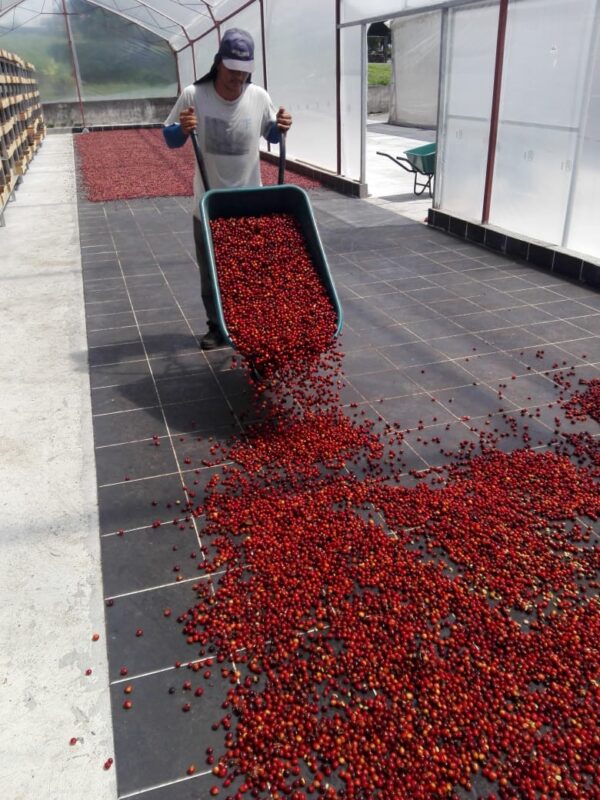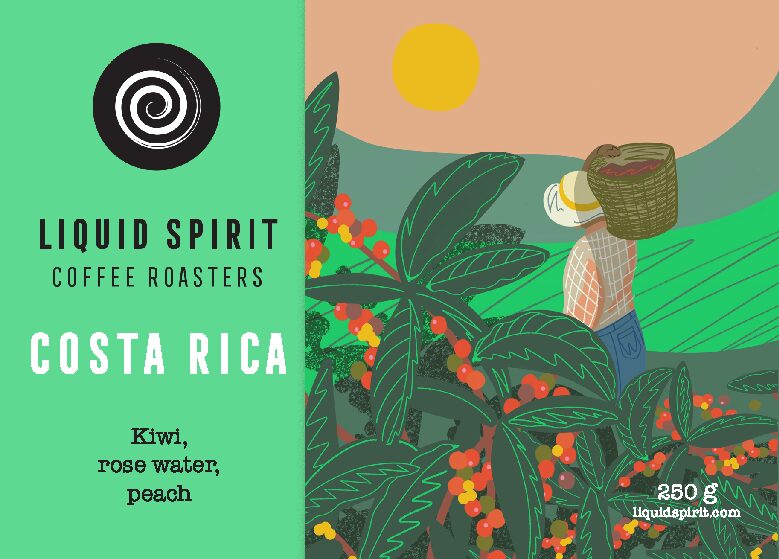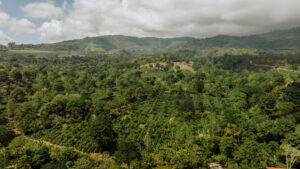Costa Rica Entre Rios Natural / Omniroast ( all brewing methods)
Aquiares, one of Costa Rica’s largest and most historic coffee farms, sits high on the fertile slopes of Turrialba Volcano. Producing coffee continuously for over a century, the farm has developed an enduring model for growing high-quality Arabica coffee, protecting a stunning natural setting, and supporting a thriving local community of 1,800 people. Established by British farmers in 1890, Aquiares was one of the first estates to produce and export Costa Rican coffee. In 1971, the farm was purchased by its current owners –
three families who have worked together with the farm´s staff and community to implement a modern model of sustainable agriculture. Today, the Estate is the largest continuous coffee farm in Costa Rica, covering 924 hectares, 80% of which is planted under shade-grown Arabica.
Nestled between the Aquiares and Turrialba Rivers, “Aquiares” means “land between rivers” in Costa Rica’s Huetar indigenous language.

The land of Aquiares is blessed with a multitude of clean water sources and even provides drinking water to three communities down-stream. Coffee plots are interlaced with natural springs and countless streams and rivers, all of which are protected with forested buffer zones.
Don Alfonso took over farm management in 1992, and at the time he was new(ish) to coffee. From the beginning, Don Alfonso made the social welfare of farm workers and the wider community one of his main priorities. His dedication has transformed the farm and the region.
The community of Aquiares – originally built to house workers on the estate – sits in the midst of the farm.
Originally, the farm owned the houses where employees lived, creating home-insecurity amongst working families. In 1992, under Don Alfonso’s management, the farm started a project to enable people to own their own houses. Each worker was given a bonus for his or her years of service, lots were priced at a fraction of the local rate, and assistance was given to apply for the government house fund. At the beginning, workers thought it was too good to be true, but as the first families obtained their own homes,everyone followed suit. In a matter of three years, the town was brought to life. It was enriched with a
deep feeling of security and achievement. Today, only around 15% of Aquiares residents work on the farm(many have gone on to become schoolteachers, doctors, etc) and 96% of these own their own home, giving them the option to take a path for their future that they, themselves, choose.
Aquiares has becoma place where many want to live, as evidenced in the value of land, which is comparable to that of SanJosé, Costa Rica´s capital. The town has its own school, youth sports program, recycling committee, earlychildhood nutrition centre, and a church built in 1925, which is a National Architectural Historic Monument.
The entire town and the Estate consider themselves to be of the same community rather than one‘belonging’ to the other!
The farm manages the entire coffee production chain, from seedling production to plant cultivation,harvesting and milling. This ensures that they are able to meet the highest standards of quality assurance and can guarantee a traceable product. Caturra is the main varietal grown on the farm, but climatechange and pests require constant experimentation with new varieties that can adapt better to future conditions.

Throughout the season,
workers from the community care for the trees: pruning, fertilizing, weeding, and protecting them.
About the coffee (Harvest & Processing):
All Aquiares coffee is picked by hand to ensure consistent high quality. Microlots, such as this one, are picked by a special team of skilled harvesters who are paid well above the daily rate for their exceptional skill in picking the ripest cherries at each pass. Each tree is visited up to seven times during the harvest to ensure that only fully red ripe cherries are picked. The skilled hands of the pickers represent the farm’s most valuable asset. Pickers hail from the community of Aquiares, nearby towns, and even from the neighbouring country of Nicaragua.
The farm ensures that all workers have a safe work environment and acomfortable place to live. Workers coming from further away can live in on-site housing and use a children’s day-care.
The farm sponsors doctors’ visits for pickers and their families twice a week where
nutritional health advice is also given. To take better care of its field workers, Aquiares has established firstof-its-kind physical therapy sessions and also a daily warm-up routine of exercise before work.
Many pickers return each year, confirming success in providing a secure home in Aquiares.
As coffee cherries come from the field the same day that they are picked, they move into Aquiares’ wetmill.
The farm produces fully washed coffees, honey processed coffees and naturals. Natural lots are
floated for density (with all floaters being removed) before being sent to the Gaurdiolas to dry, Pre-drying iscompleted in a “Centriflux” machine to remove any excess water. The coffee is then dried for around 32 hours at a low, constant temperature of approximately 45˚C – 55 ˚C in mechanical driers (Gaurdiolas). 2- hour breaks are given to the coffee to ensure consistent drying.
Finally, the coffee is rested for a month in
large silos to allow humidity and aromas to settle. Finally, the beans return to the dry mill where theparchment is removed, and the beans are sorted by size, weight, density and colour before they arebagged for export.
Although Guardiolas are common in this wet, humid area of Costa Rica, the Robleos are always searchingfor new ways to innovate in processing and drying. For instance, they knew that drying was one of theirmain challenges in producing speciality coffee – particularly as they wanted to start producing honey and
natural lots. According to Diego Robelo, “Everyone told us we were crazy. You are never going to makehoneys and naturals in Turrialba. We decided to prove them wrong.”
The Robelos sourced a greenhouse from a neighbour in the region who had been producing roses and built drying beds according to specifications gleaned from other producers. After the first lots were dried in the greenhouse, thermometers and humidity gauges still showed a great deal of temperature fluctuation
depending on time of day and weather. In order to create a constant and even temperature in thegreenhouse they installed an airflow system connected to their guadiola system (used for commercial lots).
Now, dry air of around 36 degrees Celsius circulates throughout the greenhouse, maintaining an even temperature.
The new system works well, helps increase the drying capacity of the greenhouse and
reduces variability in lots.
Country: Costa Rica
Region : Turrialba
Farm/ Station : Aquiares Estate / Robello family
Varietals: Obata
Processing: Natural
Altitude: 1100 – 1400 m above sea level
In the Cup: Kiwi, Orange Peel, Rose Water, Peach, Smooth, nice citric acidity, long lasting fruity aftertaste

We are making some improvements to our website. Thank you for your patience. Dismiss